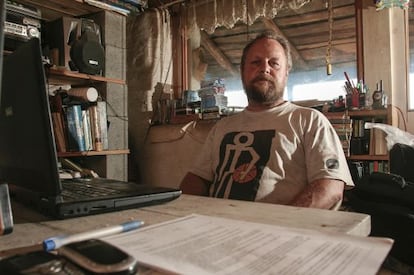Is foul play to blame for the disappearance of a Dutchman?
After 10 years spent in Galicia's Ourense province, Martin Verfondern vanished in 2010


The last time anybody saw Martin Verfondern alive was on January 19, 2010, when he left the tiny community of Santoalla deep in the mountains of Galicia's Ourense province in his battered Chevrolet to do his weekly shopping in the nearest town, 15 kilometers away.
Verfondern had moved to Santoalla from the Netherlands in the late 1990s, setting up the Centro Ammehula organic farm, which attracted backpackers from around the world looking to get back to nature during the summer months.
But over the course of his decade-long stay in Santoalla, it appears that Verfondern made a number of enemies among his neighbors, notably local farmer Manuel Rodríguez, who, despite a judicial ruling, refused to recognize Verfondern's grazing rights on the huge hillside that overlooks the village. Verfondern described the octogenarian Rodríguez as a "fascist" patriarch.
He also fell out with the community's mayor, Miguel Bautista of the Socialist Party. Verfondern had repeatedly complained about the lack of amenities in Santoalla, and particularly the damage that an open-air refuse site was doing to the water table and a nearby stream he used for his goats and sheep.
A member of Amnesty International, Verfondern described the tense relationship he endured with his neighbors as "rural terrorism," saying that he was constantly provoked and threatened. He reportedly came to blows with Rodríguez on several occasions. The Rodríguez family say that Verfondern once hit Manuel Rodríguez's wife, as well as attacking Rodríguez, injuring him.
In February 2009, Verfondern decided to contact the national media about the issue of the refuse site, adding that he had been insulted and threatened by locals for trying to clean up the village of some 50 people. He told the mayor that he would be writing to the regional government and even King Juan Carlos about the failure to provide a paved road or adequate rubbish collection in Santoalla.
EL PAÍS published an article about the dispute. It emerged that many people in Santoalla were unhappy at the numbers of tourists passing through their community.
So when guests staying at the Centro Ammehula informed the Civil Guard, they initially suspected foul play. Helicopters and divers searched the area, and the family of Manuel Rodríguez was questioned. No evidence was found to support the idea that they were involved in Verfondern's disappearance. But the case attracted the attention of the Dutch media Peter de Vries, one of the best-known reporters on Dutch television, traveled to Santoalla in 2010 to talk to Verfondern's wife, Margo Pool, who was visiting family in the Netherlands at the time of his disappearance.
Now US reporters have picked up the story. Geoffrey Gray, a reporter from The New York Times, visited Santoalla in January. A self-styled specialist in finding missing people, he interviewed many in the community, and left with a number of videos allegedly showing animal cruelty by local farmers, and even the moment that Verfondern was pushed down a local hillside while filming a local farmer.
Paul Mehrer, a lawyer taking a break at Centro Ammehula on the day that Verfondern went missing, has also returned to Sanoalla. Mehrer's brother Daniel, along with a freelance writer called Andrew Becker, spent a week in the community in April. They say that they are making a film about life in rural Galicia, using the disappearance of Verfondern as the hook. They plan to return later this year.
In the meantime, Verfondern remains on an Interpol watch list, and joins the 65 or so other people currently reported missing in Galicia. The police say that after their extensive initial search for the Dutchman, they can only wait until somebody contacts them with information as to his whereabouts. They do not rule out his having decided to disappear of his own volition.
Margo Pool continues to work Centro Ammehula, which is part of World Wide Opportunities on Organic Farms, an organization founded in Britain in the early 1970s.
Tu suscripción se está usando en otro dispositivo
¿Quieres añadir otro usuario a tu suscripción?
Si continúas leyendo en este dispositivo, no se podrá leer en el otro.
FlechaTu suscripción se está usando en otro dispositivo y solo puedes acceder a EL PAÍS desde un dispositivo a la vez.
Si quieres compartir tu cuenta, cambia tu suscripción a la modalidad Premium, así podrás añadir otro usuario. Cada uno accederá con su propia cuenta de email, lo que os permitirá personalizar vuestra experiencia en EL PAÍS.
¿Tienes una suscripción de empresa? Accede aquí para contratar más cuentas.
En el caso de no saber quién está usando tu cuenta, te recomendamos cambiar tu contraseña aquí.
Si decides continuar compartiendo tu cuenta, este mensaje se mostrará en tu dispositivo y en el de la otra persona que está usando tu cuenta de forma indefinida, afectando a tu experiencia de lectura. Puedes consultar aquí los términos y condiciones de la suscripción digital.








































